News
HIGHLIGHTS OF THE GOVERNMENT YEAR IN REVIEW 2014
Published
11 years agoon

COMMENTARY BY ELCOTT COLEBY
BAHAMAS INFORMATION SERVICES
Much of the Bahamas news in 2014 was driven by social media with hyped up and emotive presentation. On the governance front, there were a myriad of national issues that the Bahamas government tackled both legislatively and executively. Described by the government as doing the “heavy lifting,” Prime Minister the Rt. Hon. Perry G. Christie characterized the 2014 legislative agenda as arguably the most “reform driven” in recent history. This sentiment was also expressed by the Minister for National Security and leader of government business in the House, the Hon. Bernard J. Nottage. As the country continued to emerge from the protracted global recession and faced the inevitability of change, some very important and transformative decisions were made to facilitate the country’s transition through these changes that are a necessary part of growth and national development. Some decisions of governance, though necessary, were tough and unpopular but governance is not a popularity contest.
In 2014 The Bahamas Parliament passed tax reform with the passage of Value Added Tax (VAT) with a targeted 1st Jan 2015 implementation date; four constitutional amendment Bills centering around the theme of equality were tabled; the House passed the Persons with Disabilities (Equal Opportunities) Bill; the House also passed the historic Gaming Bill with modernized the laws and regulations governing land based casino operations, placing land based casinos in The Bahamas on par with top casino operations in the world such as Macau and Las Vegas. Also, the Gaming Bill legalized web shop gaming for Bahamians for the first time in this country’s history. FATCA came into effect; the condominium bill was passed; the Environment Minister tabled the Petroleum Act and attendant regulations as our first step toward energy sector reform; both House chambers passed historic Stem Cell legislation and implemented a new Immigration Policy. The Bahamas government also implemented prison reform and established the Foreign Service both with Acts of parliament while the Prime Minister appointed and chaired a national taskforce that educated and prepared the country for the newest global health threat to confront us in 2014, the Ebola Virus Disease (EVD).
The Ministry of Tourism celebrated its golden anniversary as a government ministry, an upgrade from the Tourism Promotion Board until 1964. Coincidentally, the country recorded its highest tourist arrival numbers in history, beating out 2013 arrivals of 6.2 million visitors. Leading the way in the resurgence of tourism was romance, religious and sports tourism. The Bahamas hosted the IAAF World Relays, the Popeye’s Bahamas Bowl, co-branded with NBA and NFL teams and launched the 16 weddings promotions to showcase the unique visitor experiences on 16 different islands. New airlift gateways from several Canadian and US cities in addition to the opening of new tourism field offices in the northeastern US seaboard, the Midwest and the west coast increased airlifts to islands such as San Salvador, Exuma, Elauthera, Bimini and Grand Bahama. Resort World Bimini with its casino and fast ferry service literally transformed the economic landscape of Bimini in 2014.
During this year of culture, The Bahamas beat a world record for most conch shells blown at one time at our 41st independence celebrations at historic Clifford Park. The Bahamas government announced and began preparations for Junkanoo Carnival 2015 and named 41 Cultural Warriors during 2014.
Dr. Rodney Smith was named President of the College of The Bahamas with the mandate to transition the country’s tertiary institution to university status by 2016 and we launched our National Development Plan at the College of The Bahamas, an important player in its crafting and shaping.
The Bahamas Agriculture and Marine Resources Institute, or BAMSI, was established, received its first enrollment of students and reaped its first harvest of fruits from its commercial farm in 2014. BAMSI is a major policy thrust of the government to address the high food import bill that is in excess of one billion American dollars annually. The Prime Minister in his groundbreaking address cited the preparation of some 70,000 meals daily for the indigent as another compelling reason for government intervention to facilitate a paradigm shift in the access of affordable healthy food and bolstering the country’s level of food security.
The more than $120 million National Civil Aviation structural framework in The Bahamas made significant strides in 2014. The consultancies to determine the model options for the restructure of Civil Aviation Regulatory Oversight and Function and the provision of comprehensive, empirical data to effect evidence-based, decision-making were in the advanced stages. Additionally, enabling oversight legislation was passed in Parliament and a nationwide audit of all 28 government-owned airports was completed. The government also broke ground on a brand new multi-million dollar Radar tower that will usher in a new era in air space management, air traffic control and training in The Bahamas. By the end of 2014, this radar system was more than 85% complete.
The Bahamas, however, was not immune from and faced its share of challenges in 2014. The Prime Minister dismissed the Parliamentary Secretary in the Ministry of Works and Urban Development and the Minister of Financial Services resigned from the cabinet for personal reasons. It was the year Canine Distemper hit Nassau and Bahamian Rock Iguanas were smuggled out of the country from San Salvador. There was the National Security Agency (NSA) spying story where it was alleged that the NSA officials eavesdropped on the cell phone conversations of Bahamians. Also, the Bahamas government came to the aid of the ailing Bank of The Bahamas in a $100 million government bailout. The government continued to tackle the serious scourge of crime with 122 murders recorded in 2014. A compendium of crime bills, intensified saturation patrols in criminal hot spots, increased resources for the police, additional courts and an amendment to the Jury Act were some of the measures taken by the government to fight this scourge. To fight illegal poaching, illegal migration and human smuggling and other transnational crimes committed on the high seas, the $232 million asset acquisition called the “Sandy Bottom Project” materialized in 2014 with three of the nine defence force vessels turned over the Royal Bahamas Defence Force.
On the 22nd of December 2014, a US federal court fined French energy giant Alstom more than $772 million for its involvement in an elaborate bribery scheme involving officials in the United States, Saudi Arabia, Egypt and The Bahamas. Court documents revealed that a government official received some $300,000 in exchange for a contract to supply the Bahamas Electricity Corporation (BEC) with slow speed diesel engines.
Magnetic Media is a Telly Award winning multi-media company specializing in creating compelling and socially uplifting TV and Radio broadcast programming as a means for advertising and public relations exposure for its clients.

You may like
-
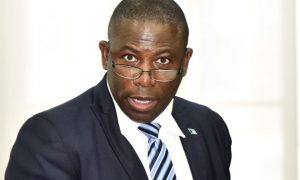

Bahamas Ministry of Health addresses news headline about ‘CoVax’ for children
-


New COVID-19 Initiatives to Curb Rise in Bahamas Family Island Cases
-
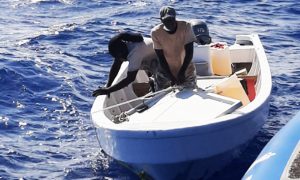

Turks and Caicos Fishermen rescued at Sea
-


Bahamas National Security Minister Lauds Contract Signing for Police Body and Dash Cams
-
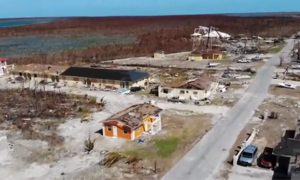

McClean’s Town Conch Cracking interrupted by Hurricane Dorian
-
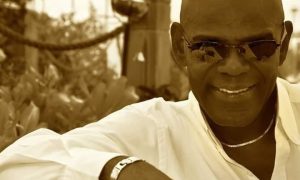

Bahamian music legend gunned down at home in Turks and Caicos
News
Commonsense, Not Confrontation: Why Kamla Persad-Bissessar Is Right
Published
1 month agoon
December 27, 2025
This debate did not start with Donald Trump, and it did not start this month.
For more than a decade, this reporter has had a front-row seat to repeated, urgent calls from across the Caribbean for stronger intervention by the United States in response to gun- and narcotics-fuelled violence that has hollowed out our communities. Long before today’s headlines, leaders warned that transnational gangs were outgunning police, draining public resources and stealing our youngest people.
Much of the public messaging leaned toward calls for fewer guns flowing from the United States, but the practical response from Washington evolved into something else: tactical undergirding of the Caribbean. Training, intelligence sharing, maritime surveillance and joint operations expanded under successive U.S. administrations — Republican and Democrat alike.
Then came Venezuela.
President Nicolás Maduro proved himself an unhinged and destabilising force, openly threatening Guyana’s oil-rich territory and pushing the region to the brink of a conflict no Caribbean state could afford. The United States showed up. The threat of war was blunted. That mattered.
But while geopolitical flames were contained, the narcotics trade exploded.
CARICOM convened emergency meetings on transnational gang violence. Crime became so pervasive that it was formally classified as a public health threat. Entire communities were terrorised. Courts clogged. Police forces stretched beyond capacity.
And now — quietly but noticeably — the tempo has shifted.
While no single forensic study can capture the full picture, it is easily verifiable on the ground that major narcotics busts and trafficking activity have slowed in recent months. Something has changed. Pressure works.
This is the reality Prime Minister Kamla Persad-Bissessar is responding to.
Her critics accuse her of breaking ranks. What she is actually doing is refusing to indulge in strategic hypocrisy — demanding international help to confront narco-terrorism while appearing to defend or excuse the very networks and actors we have spent years condemning.
Sovereignty is not an insult. The Caribbean invokes it constantly. To deny it to the United States — especially when the policies in question were telegraphed months in advance and remain adjustable — is not diplomacy. It is posturing.
What is most troubling is the region’s selective memory. CARICOM has directed months of rhetorical fire at Trump-era policies, yet when disaster struck — from security crises to Hurricane Melissa — the United States remained one of the region’s most reliable supporters. Outcomes matter more than allegiance theatre.
Kamla Persad-Bissessar is not suffering from Trump Derangement Syndrome. She is applying commonsense statecraft. She understands that small states do not gain leverage by moral outrage alone, and that credibility is lost when we appear aligned with individuals, regimes or activities we ourselves have deemed a threat.
Her warning to CARICOM is simple and necessary: do not undermine your own cause.
The Caribbean’s fight against narco-violence, corruption and instability has been long, costly and painful. If pressure is finally producing results, we should be wise enough to recognise it — and brave enough to say so.
Angle by Deandrea Hamilton. Built with ChatGPT (AI). Magnetic Media — CAPTURING LIFE.
News
Beaches Turks and Caicos Showcases and Supports Local Creativity
Published
5 months agoon
September 12, 2025
September 12, 2025
PROVIDENCIALES, Turks & Caicos Islands – The Turks and Caicos Islands are home to a wealth of creativity, from artisans and craft vendors to musicians and performers. Beaches Turks and Caicos, the Caribbean’s leading all-inclusive family resort, has pledged its continued support for these individuals by providing meaningful platforms for them to share their skills and stories with guests from around the world.
The resort’s commitment is most evident in its weekly Cultural Night showcase, where visitors are immersed in the vibrant traditions of the islands. Guests enjoy live performances which feature local music genres such as ripsaw, while artisans display and sell handmade creations. This event not only enriches the guest experience but also strengthens economic opportunities for local entrepreneurs.
Entertainment Division Manager Garett Bailey emphasized the significance of Cultural Night, “we want to showcase everything the Turks and Caicos Islands culture has to offer. Our goal is for guests to leave with a deeper appreciation of the island’s art, music and traditions, while giving local talent the opportunity to share their creativity with visitors from across the globe.”
Beyond Cultural Night, Beaches Turks and Caicos also welcomes local craft vendors onto the resort every Wednesday and Friday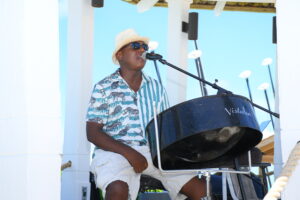 where they are offered a direct space to market their goods. Guests have easy access to the Turks and Caicos Cultural Marketplace, where they can purchase authentic local arts and crafts.
where they are offered a direct space to market their goods. Guests have easy access to the Turks and Caicos Cultural Marketplace, where they can purchase authentic local arts and crafts.
Managing Director, James McAnally, highlighted how these initiatives reflect the resort’s broader mission, “we are committed to celebrating and sharing the vibrant culture of these islands with our guests. By showcasing local artistry and music, we not only provide entertainment but also help sustain and grow the creative industries of the Turks and Caicos Islands. From our cultural showcases to nightly live music, we are proud to create authentic connections between our guests and the people of these islands.”
Local musician Keon Hall, who frequently performs at the resort, expressed gratitude for the ongoing partnership, “being able to share my music with Beaches’ guests has created lasting relationships. Some visitors return year after year and request songs from previous performances. This partnership continues to celebrate what we do and strengthens the bond between local artists and the resort.”
The resort’s support of local artisans and entertainers extends beyond business opportunity; it is about preserving heritage and sharing stories. Guests take home more than souvenirs; they leave with experiences that deepen their understanding of Turks and Caicos’ culture and history.
Public Relations Manager, Orville Morgan, noted the importance of this commitment, “for many visitors, these interactions represent their first genuine connection to the Turks and Caicos Islands. From artisans and musicians to farmers and transport operators, our local talent helps shape every guest experience. At Beaches, we are proud to give them the stage to share their stories and their heritage.”
Beaches Turks & Caicos remains dedicated to developing cultural connections and supporting the artisans, musicians and entrepreneurs whose creativity makes the Turks and Caicos Islands unique. Each guest experience is an opportunity to celebrate and sustain the spirit of the islands.
Caribbean News
“Barbecue” is Cooked! US Turns Over 11 Million Haitians into Potential Informants with $5 Million Bounty
Published
6 months agoon
August 12, 2025
August 12, 2025
The United States just set fire to the underworld in Haiti — and this time, the smoke might finally flush out the man many call the most feared in the Caribbean.
On Tuesday, the U.S. government slapped a $5 million bounty on the head of Jimmy “Barbecue” Chérizier, the ex-police officer turned gang boss accused of orchestrating massacres, torching neighborhoods, and strangling Haiti’s capital into chaos. This isn’t just a headline — it’s a full-blown game-changer.
turned gang boss accused of orchestrating massacres, torching neighborhoods, and strangling Haiti’s capital into chaos. This isn’t just a headline — it’s a full-blown game-changer.
That kind of cash — offered under the State Department’s Transnational Organized Crime Rewards Program — is enough to turn the country’s entire population, more than 11 million people, into potential informants overnight. Add the millions in the Haitian diaspora, and Chérizier isn’t just wanted. He’s surrounded.
The Number That Changes Everything
Five million U.S. dollars today equals about 655 million Haitian Gourdes. In a country where many scrape by on less than $5 a day, that’s not just life-changing — it’s life-defining. It’s enough to rebuild homes, put generations through school, or buy a one-way ticket far from the gunfire.
In a place where trust is scarce and survival is everything, that figure is more than tempting — it’s irresistible. For Chérizier, it means every friend could be a future informant, and every loyalist might be calculating the cost of staying loyal.
‘We Will Find Them’ — Jeanine Pirro, U.S. Attorney
Jeanine “Judge Jeanine” Pirro, the U.S. Attorney, set the tone with fire in her voice. “This indictment is the first of its kind,” she announced. “Jimmy Chérizier, also known as ‘Barbecue,’ is a notorious gang leader from Haiti who has orchestrated and committed various acts of violence against Haitians, including the 2018 La Saline attack in which approximately 71 people were killed. He both planned and participated in that massacre.
“Anyone who is giving money to ‘Barbecue’ cannot say, ‘I didn’t know.’ They will be prosecuted, and we will find them. They are supporting an individual who is committing human rights abuses, and we will not look the other way.”
Pirro wasn’t just going after Chérizier. She was sending a warning to the Haitian diaspora accused of feeding his war chest from abroad: the days of claiming ignorance are over.
‘No Safe Haven’ — Darren Cox, FBI
Then came Darren Cox, Deputy Assistant Director of the FBI, delivering the muscle of America’s most powerful investigative force. “There is no safe haven for Chérizier and his network,” Cox declared. “We are closing every link, every cell.” Since January, he said, the FBI has arrested three Top Ten fugitives, taken more than 19,000 criminals off the streets, and seized thousands of tons of narcotics — enough to save millions of lives across the U.S.
The FBI’s Miami and Houston offices have already bagged one of Chérizier’s Viv Ansanm associates inside the United States without firing a shot. “These efforts are a deliberate and coordinated plan,” Cox said, “to protect our communities and confront escalating threats from terrorist organizations like Viv Ansanm.”
‘Three-Year Investigation’ — Ivan Arvelo, HSI
Ivan Arvelo, Assistant Director of Homeland Security Investigations, brought the receipts. “This is the result of a three-year investigation into Chérizier’s procurement networks, cash pipelines, and operational financing that violates sanctions,” he explained. Arvelo described 400 structures destroyed, entire communities erased, and a gang exploiting U.S. dollars, technology, and immigration loopholes to keep its killing machine running. “We tracked how Americans unwittingly bankrolled brutality,” he said — proof that the net is tightening both inside Haiti and abroad.
‘The Worst of the Worst’ — Chris Lambert, State Department
Chris Lambert, representing the State Department’s International Affairs division, gave the political bottom line.
“Mass violence in Haiti must end,” Lambert said. “The instability resulting from Chérizier’s actions fuels illegal migration, regional instability, and transnational crime. We will continue to apply every tool available — including our rewards programs — to stop the spread of unchecked violence, especially to target the worst of the worst criminal leaders threatening the people of our hemisphere.”
instability, and transnational crime. We will continue to apply every tool available — including our rewards programs — to stop the spread of unchecked violence, especially to target the worst of the worst criminal leaders threatening the people of our hemisphere.”
Lambert confirmed what many have long known: Chérizier is not just a gang leader. He commands Viv Ansanm, officially designated in May as a Foreign Terrorist Organization. In the eyes of the U.S., that makes him not just Haiti’s problem — but everyone’s.
Why Haitians May Not Resist
In Haiti, money talks — loudly. And when you put 655 million Gourdes on the table, it shouts.
That’s the kind of figure that turns casual acquaintances into informants and makes even the most hardened loyalist wonder if the payout is worth more than the risk. It’s not a matter of “if” word gets out, it’s a matter of “who will be first to collect.”
For grieving families, it’s a chance at justice. For the desperate, it’s a chance at survival. For Haiti as a whole, it’s hope — wrapped in the most dangerous of temptations.
An Answer to Prayers
For years, Haiti’s headlines have been a scroll of horrors — kidnappings, executions, burned neighborhoods, bodies in the streets. Chérizier’s name has been attached to too many of them.
This move by the U.S. isn’t just strategy. It’s personal. It’s a signal to every Haitian — at home or abroad — that the days of impunity could be ending.
I’ll admit it: when I heard the news, I danced, I sang, and I nearly cried. Not because $5 million is a lot of money, but because of what it means — the possibility, at last, of stopping the man accused of helping turn Haiti into hell on earth.
Four officials, four angles, one mission: Pirro’s fire, Cox’s grit, Arvelo’s precision, Lambert’s conviction. Together, they’ve put the heat on “Barbecue” like never before.
BBQ is cooked. The only question now is: which one of over 11 million potential informants will serve him up?




